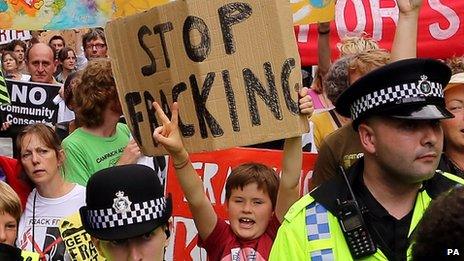Half of the UK 'suitable for fracking', report says
- Published

Fracking is controversial and has attracted a lot of local opposition
More than half of the UK could be suitable for shale gas fracking, according to a government-commissioned report.
Under the maximum scenario, up to 2,880 wells could be drilled for oil or gas in a new licensing round, the report says, generating 16,000 to 32,000 jobs.
This would markedly increase lorry movements and could squeeze water supplies for local communities.
But the environmental impact would be "manageable", say consultants AMEC.
A single well might create up to 51 daily lorry movements, AMEC says, but laws and systems already in place would be enough to absorb the environmental upheaval.
Shale gas
The report, commissioned by the Department of Energy and Climate Change (DECC), shows that 100,000 sq km of land is available for drilling.
BBC reporter John Moylan visits the British Geological Survey to find out which areas offer the most potential for shale gas
Under the most optimistic scenario, domestic shale gas production could total 4.32-to-8.64 trillion cubic feet of gas throughout the lifetime of a well - around 20 years.
That is enough to fulfil a quarter of the UK’s annual demand.
It says greenhouse gases during the exploration phase could be up to 0.96 million tonnes of CO2 – totalling just over 15% of the UK’s emissions from all oil and gas production.
Home-grown gas would have lower emissions than imported liquefied gas, the report maintains.
The authors admit there are still large uncertainties in this area, with the academic debate unresolved over the total emissions from fracking activities, including methane leakage when the earth is fracked.
They envisage that the sharpest environmental issues will be at the local level. The availability of water and the need for trucking are both expected to cause local controversy, especially in quiet country areas with narrow roads.
Water tankers
Energy Minister Michael Fallon: "We're stepping up the search for shale now"
Fracking – a process that involves splitting shale rocks deep underground - uses huge amounts of water, and in some places this would need to be shipped in by tanker.
Around 75% of water used for fracking flows back, and the Environment Agency wants it re-used for further fracking, with the addition of extra water.
But it is expected that in some places waste water will need to be removed from site by lorry, and the report’s authors say this could put a strain on local water treatment.
The energy minister Michael Fallon said residents’ objections would be dealt with at the local level by the planning system and water issues dealt with by the Environment Agency.
He said: “We have a robust system of regulations and, provided companies have gone through due process, the map shows there is a huge amount of shale gas. What’s important for public confidence is to show the system is robust."
He declined to answer whether he would be happy with fracking taking place under his own home.
The figures in the report are based on conjecture because it's not known how readily the rocks in the UK can be fracked to release their gas.
The report envisages that at the lowest scenario there would be just 180-to-360 wells, with 2,500-to-5,000 jobs created. The authors admitted that the number of jobs for local people on the average site might total just 17%.
Follow Roger on Twitter @rharrabin , external
Correction: This story was updated on 19 December 2013 to make it clear that the report says it is possible that a single well could create 51 lorry movements every day.
- Published17 December 2013
- Published17 December 2013